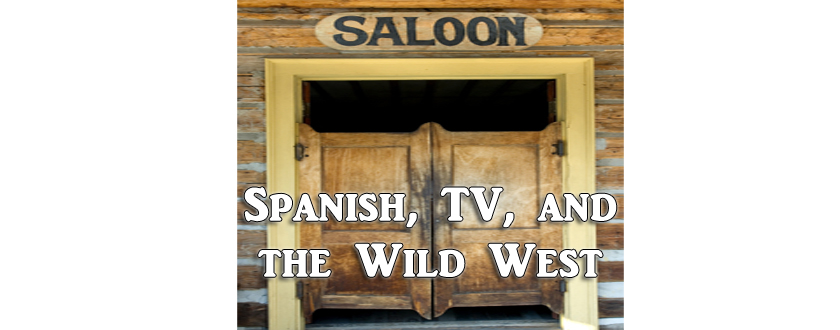
I have a standing date.
Not a romantic one, it’s with a bloke.
Every second Sunday I get together with an amigo to watch Deadwood.
It’s a great show about the rough and tumble days on the gold fields in South Dakota in the 1870s.
I recommend the show if you like gritty drama. However, if you don’t care for profanity, give it a wide berth.
Some of the language in the show would make a trooper blush.
It has great writing and great acting but it’s definitely not a family show, which is why I watch it with a mate.
A while back we were watching a scene that seemed pivotal to the storyline.
Mi amigo me dijo, “qué dijo”. (My friend said, “what did he say?”)
No entendí nada. (I didn’t understand a thing.)
Those rugged pioneers sure mumble a lot.
Todavía no entendíamos ni jota. (We still didn’t understand one iota.)
So we decided to put on the subtitles.
We are both native English speakers but there we were reading the English.
This was not the first time I have used subtitles for shows in English
I did it regularly with The Sopranos. Those rough versions of New Jersey accents were hard to catch at times.
I did it with the English version of Life on Mars too. I didn’t want to miss any of the Gene Genie’s Manchester mutterings.
I’m a regular closed captioning user… in English
TV dramas can be hard to understand.
Yet when people find Spanish TV hard they often judge themselves harshly. They feel they are failing.
Un consejo, (a piece of advice.)
Go easy on yourself.
Don’t invalidate all the great things you can do with your Spanish just because some television shows are hard to understand.
Some shows are hard to understand in English.
I’ve struggled with Sopranos, Deadwood, The Gene Genie and The Sweeney.
If you have a Spanish TV available with closed caption or DVDs with subtitles put them on. It’s an opportunity to learn Spanish and be entertained at the same time.
My own experience is that TV is one of the last parts of Spanish you acquire.
There are many achievements along the way that you’ll enjoy before TV feels natural.
Before I could understand TV dramas I could:
- Enjoy face-to-face conversations
- Read novels
- Watch the news and current affairs
- Listen to music
- Read newspapers
- Participate in dinner conversations
- Speak in front of an audience
- Make a business proposal to the Tijuana Chamber of Commerce
- Tell jokes and get a laugh.
The last one might be due to the good manners of many Spanish speakers; I don’t usually get a laugh when I tell jokes in English.
-Policía! hay dos mujeres que se están peleando por mi! -¿Y que problema hay? -Pues que va ganando la fea!
(Police! There are two women that are fighting over me. And what problem is there? Well the ugly one is winning.)
See what I mean about the jokes?
Regresando al tema. (Back to the subject)
You will be able to accomplish a lot with your Spanish before you fully understand all the TV shows.
Here’s how to fast-track your Spanish speaking abilities.
The beauty of the method is it’s sequential so your Spanish can become like the famous affirmation, “in every day in every way my Spanish is getting better and better.”
It’s step by step, so the last lesson feels just as easy as the first lesson. By the end of each lesson you’re speaking more Spanish.
Details of the sequential fast track to Spanish are on this page.



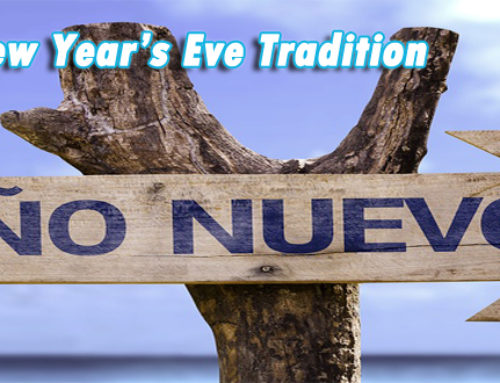
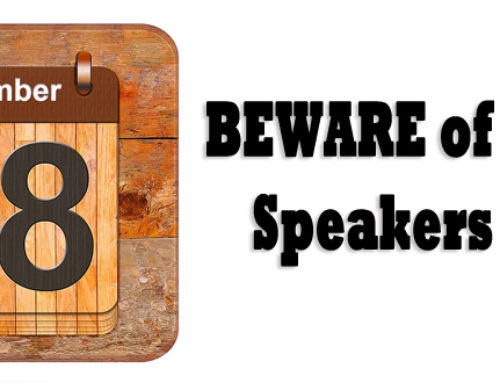
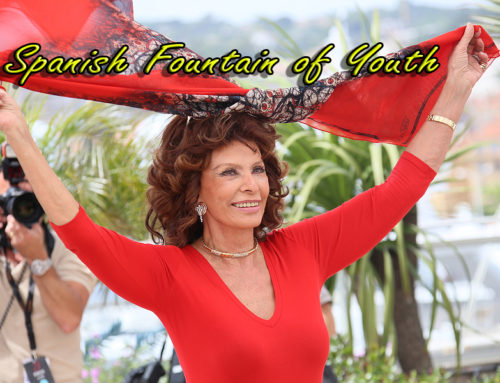
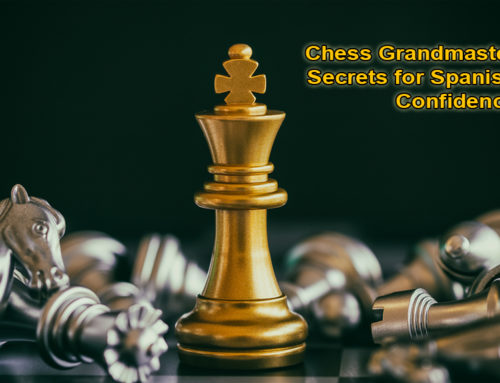


Hi Marcus, the light hearted but helpful emails you send are a good way to keep us interested and ploughing on with your courses. I’m getting there. Gracias por tu ayudamos.
Hola Marcus,
Gracias por compartir su experiencia!
Me rei de la broma.
Galina.
Thanks! I really enjoy the emails, with tips and Spanish related stories. Cheers, Victor
I look forward every day to see your mail. I am not quite where i want to be yet but you have helped me more than: 1 yr high school Spanish, 2 Sym of College Spanish and the Border Patrol Academy Spanish. Then 30 years with the Immigration Service trying to understand. Would wake up conjugating verbs. I never could carry on a conversation. I was only somewhat comfortable in a Question an Answer interview. Thank you for doing all the former couldn’t.
Thank you for lessons. Happy birthday to You:)
Hello Marcus
Thank you! I quite enjoy your ramblings. You make learning Spanish so much fun.
Hi Marcus
I must tell you that I find your synergy Spanish very helpful because it gives me confindence
to try and to speak Spanish with out worrying.
I really love your video section.
Thanks so much.
I really enjoy your emails. Keeps me on track. Still enjoying your synergy course but do need to spend more time on it. It is however very satisfying to be able to finally say a few things with complete confidence. Thanks so much.
I am glad that there are still caring people in the world who are willing to close the communication
gap. thanks for being a great sociable human being. The world will definitely be a less
confusing space for travelers friends and business people.
¡Buena idea! Never thought of it. All it needs is brains.! Gracias, Jean
hola Marcus, I have been getting your tips for many years and still can’t hold a conversation in spanish. However that is not your fault, it is mine for not spending enough time on it. My son-in-law
is a native spanish speaker, married to my daughter who speaks well and can hold a conversation.
They now have a 5 y.o daughter who he speaks spanish to all the time. Recently the childcare teacher asked our daughter to read a storybook in spanish to the class and for our grand-daughter
to translate to the class. This little one is now trying to help me learn more. I love your SOCKS story – will hit them with this amazing piece of spanish when next we meet.
que lo passes bien. and thank you so much for making this language more accessible and fun.
gracias. elizabeth.
I enjoyed the dialogue and the comment about the profanities tickled me because one of the things that surprised me when I moved to Spain was the amount of swearing that occurs during normal conversation. Now I am no angel, but a little old lady swearing out loud in the supermarket when she dropped something or a father walking along the seafront telling his young son that such and such a person is ****** and a ***********, and these are the most basic 4 letter words in English kind of take me back. I was having a conversation with 5 Spanish students of English at an Intercambio about it, and although they all agreed that swearing was common
only one thought it inappropriate or uneducated. Learning swear words is essential in Spain and expressions too. ‘ de Puta Madre ‘ ‘your mother is a whore’ is an exclamation that means great, cool or fantastic here in Spain and there are many others. It is listed as hard slang and only to be used amongst friends but I have heard it on buses, in queues for the theatre and many other places.
Hi Marcus thanks for the confidence boost! Whenever in Spain I always watch Spanish TV, particularly sport as watching the action I find, helps to part understand the commentary.
Many actors/actresses today on UK TV do not have clear diction, especially the “soaps”
Thanks you for this advice.I can also read newspapers and novels, write intelligible letters and at least make myself understood in conversation, but TV usually leaves me in the dust, and it has been frustrating, I feel much relief in reading your comments
Marcus, Thanks, I feel better from your advice. Regardless, it is hard to concentrate on the Spanish, subtitles or not, during the telenovelas!!!!
Thanks for this encouraging email! (You might enjoy “Breaking Bad,” another gritty drama in its last season.)
Gracias Marcus, disfruto mucho tus historias. Trabajas muy duro por nosotros.
Sylvia
I like your notes/blogs!
tele novelas – the Brazilian ones are excellent – clear and interesting.
Also, Spanish-dubbed-British-shows are excellent too!
Thanks!
Wonderful blog post! Very witty, very entertaining, very encouraging, and a terrific example of excellent salesmanship and superb writing. Got to say I am truly impressed! Send more. You just captured my intense interest completely. gracias!
Marcus that gives me a lot of encouragement, because Spanish TV destroys my confidence. So much so that I no longer watch Spanish TV. Anyway, poco a poco!
I actually can understand about 95% of TV shows when I put the Spanish caption on.
kwee